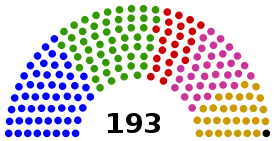Budget

The General Assembly also approves the budget of the United Nations and decides how much money each member state must pay to run the organization.
The Charter of the United Nations gives responsibility for approving the budget to the General Assembly (Chapter IV, Article 17) and for preparing the budget to the Secretary-General, as "chief administrative officer" (Chapter XV, Article 97). The Charter also addresses the non-payment of assessed contributions (Chapter IV, Article 19). The planning, programming, budgeting, monitoring and evaluation cycle of the United Nations has evolved over the years; major resolutions on the process include General Assembly resolutions: 41/213 of 19 December 1986, 42/211 of 21 December 1987, and 45/248 of 21 December 1990.
The budget covers the costs of United Nations programmes in areas such as political affairs, international justice and law, international cooperation for development, public information, human rights, and humanitarian affairs.
The main source of funds for the regular budget is the contributions of member states. The scale of assessments is based on the capacity of countries to pay. This is determined by considering their relative shares of total gross national product, adjusted to take into account a number of factors, including their per capita incomes.
In addition to the regular budget, member states are assessed for the costs of the international tribunals and, in accordance with a modified version of the basic scale, for the costs of peacekeeping operations.
Comments
Post a Comment